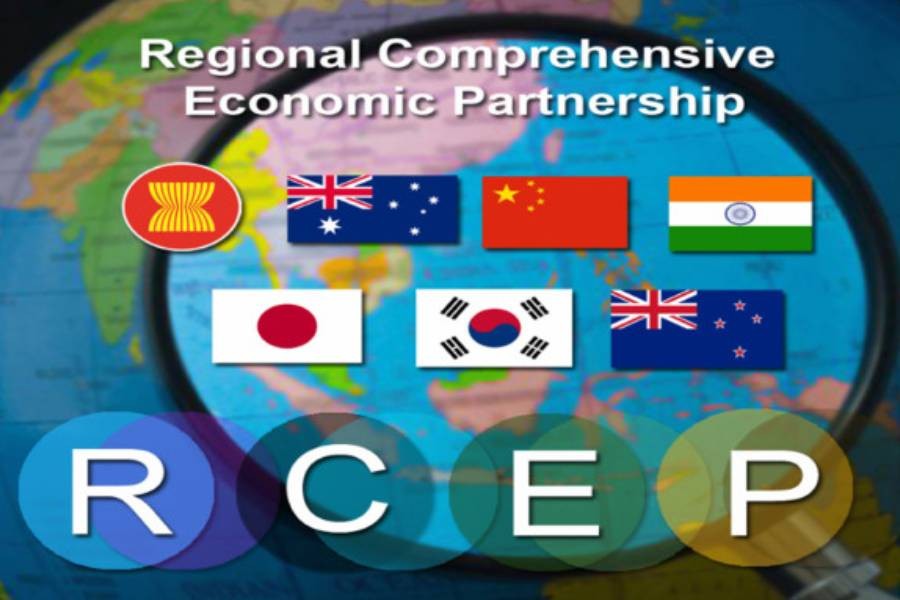Experts and analysts during a webinar on Thursday said Bangladesh may face challenges in attracting foreign direct investment (FDI) for formation of China-led Regional Comprehensive Economic Partnership (RCEP).
Bypassing Bangladesh, they said, investors from China, Japan and South Korea may consider Myanmar, Vietnam, and Cambodia, which are members of the new trade bloc, better investment destinations.
They suggested that Bangladesh try to join or at least strike a deal with the RCEP to safeguard economy after its graduation from least-developed country (LDC) status in 2024.
They were addressing a webinar 'RCEP: Challenges and Options for Bangladesh' by South Asian Institute of Policy and Governance (SIPG) and School of Business and Economics (SBE) of North South University (NSU).
Metropolitan Chamber of Commerce and Industry (MCCI) president Nihad Kabir, Bangladesh Employers Federation (BEF) secretary general Farooq Ahmed, Bangladesh ambassador to the Netherlands Riaz Hamidullah spoke.
SANEM executive director Prof Dr Selim Raihan and SBE dean Dr Abdul Hannan Chowdhury also spoke at the event chaired by NSU vice-chancellor Prof Atiqul Islam and moderated by SIPG senior fellow and former foreign secretary Shahidul Haque.
On November 15, ten ASEAN members along with five of its major trade partners-Australia, China, Japan, South Korea and New Zealand-signed a free trade agreement (FTA) named RCEP.
The signing is seen as a major accomplishment, illustrating that the Asia-Pacific region can organise its trade and investment regime without the United States and Europe.
Expressing concern over the RCEP, Dr Raihan said the RCEP will further weaken Bangladesh's competitiveness in the Asia-Pacific region.
The country has been unsuccessful in signing any bilateral trade deals or FTAs with partner countries.
Being RCEP members, competitors like Myanmar, Cambodia, and Vietnam will certainly become better destinations for foreign investors than Bangladesh, Dr Raihan cited.
These challenges will intensify once Bangladesh graduates from the LDC status and becomes a developing nation after 2024, he observed.
"Initially, there was no option for Bangladesh to join the RCEP but the initiators kept a provision, allowing other countries to join, which should be considered by Bangladesh in near future."
In that case, Bangladesh needs to focus more on increasing the quality of products and raise standards of labour, copyright, e-commerce, and other relevant things, the SANEM executive said.
MCCI chief Ms Kabir said despite having advantages like demographic dividend, cheap labour and geographic location, Bangladesh always falls behind in luring FDI.
"Why we haven't been successful in signing any FTA or bilateral trade agreement?" she questioned.
"What stops us is ourselves because we don't look forward," Ms Kabir remarked.
"Policymakers fear revenue losses in the short term, but we need to take bold steps by joining trade blocs like the RCEP to get benefited in the long run."
BEF secretary Mr Ahmed said Bangladesh has been falling behind in signing FTAs or bilateral trade deals on grounds of high labour rights provisions.
But there is no labour provision in the RCEP yet, which will definitely give the country some advantages in getting FDI if it joins the bloc, he stated.
To join the bloc, Mr Ahmed said, Bangladesh needs to diversify its basket of products and manufacture high-value goods in a bid to compete with other countries.
In welcome remarks, SBE dean Mr Hannan said the RCEP aims to mutually broaden and deepen economic integration among its member states by simplifying and standardising customs procedures.
With a combined GDP of $26.2 trillion, the RCEP covers 30 per cent of the 2.2-billion global population, 28 per cent of $5.4-trillion cumulative global trade, he said.
SIPG director Dr Sk Tawfique M Haque, NSU Prof Gour Gobinda Goswami and WTO development division head (IDC unit) Taufiqur Rahman also addressed the programme.


